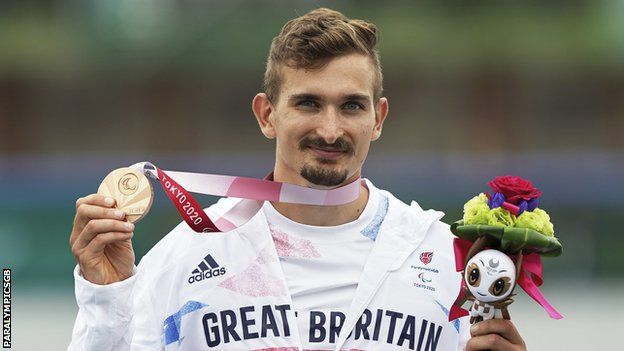Stuart Wood: Paralympic bronze medallist targets return after cancer treatment
- Published

Wood has won medals at European and world championships as well as at the Paralympics
It wasn't altogether surprising that Para-canoeist Stu Wood was feeling a bit below par as he prepared for last year's Tokyo Paralympics.
The 28-year-old Briton was working hard to make his debut Games and although he felt things weren't quite right, he put it down to the stresses of being an elite athlete and the pressures of getting ready for the Games.
After winning bronze in the VL3 category at the Sea Forest Lake in Japan, Wood followed up with a World Championship silver two weeks later before a well-earned break. But instead of the rest helping him to recharge, the health concerns remained.
"I had found a lump in my neck just prior to the Worlds, but during the month off I really wasn't recovering in the way I would have expected," he tells BBC Sport.
"I wasn't feeling as fresh as I should have and weight loss that I had experienced prior to Tokyo continued.
"I booked to see a GP, but before I got an appointment, I started getting bad night sweats. I knew then that something definitely wasn't right."
Wood was diagnosed with Stage 3b Hodgkin lymphoma - a type of blood cancer - and his world turned upside down.
"Your head doesn't jump straight to cancer when you are 27 and an elite athlete," he says.
"The doctors thought quite quickly that it could be lymphoma because I had the classic symptoms.
"I was at the hospital the following day undergoing tests and the next month was a blur of biopsies and scans and appointments."
The joy of his Tokyo medal seemed a world away as Wood saw his immediate future plans in shreds.
Wood competes in the va'a - an outrigger canoe which has a support float and is used with a single-blade paddle
Four weeks after his first appointment, he started the first session of 12 weeks of chemotherapy, supported by girlfriend and GB team-mate Lindsay Thorpe, plus family, friends and the rest of the British Canoeing team.
Around 2,100 people are diagnosed with Hodgkin lymphoma in the UK annually. Although aggressive, it is one of the most easily treated, external types of cancer.
Despite the prognosis, Wood faced some tough times as he struggled with his situation and the challenges of the treatment.
"When someone says you have cancer, you immediately think the worst and you don't know what will happen or what the plan will be," he says.
"As athletes we live on plans and for that to be ripped up and you don't know what is going on for a while, it really throws you.
"The most challenging part for me was the month between diagnosis and starting treatment because you don't know what is going to happen. Once I had a plan, even though I knew it wouldn't be fun, at least I knew I could focus on the process and focus on one step at a time."
After researching, Wood realised that other elite athletes have had the same condition and returned successfully to competition after treatment.
He found particular inspiration from the story of Canadian snowboarder Max Parrot who won Olympic slopestyle silver in February 2018 but was diagnosed later that year and had six months of treatment before returning to competition and winning Olympic gold in 2022.
"The hardest part for me was seeing Stu suffer with the side-effects from the treatment," recalls Thorpe.
"He is normally so strong and so positive and relaxed so to see him in that way, I didn't know how to approach things.
"But his athlete mentality absolutely helped him through the challenges."
Wood got the all-clear in late spring and to mark his comeback to training, his GB team-mates held a mass paddle relay which helped increase awareness of his condition and also raised more than £1,000 for the Lymphoma Action charity.
Wood's return to the elite programme has been carefully planned by his coaches and medical team and although he is not set to return to competition until next year, the 2024 Paralympics are part of his plans.
"When I started I looked to see others who have come through treatment successfully," he says.
"Those positive stories really do help to keep focus on the future and what you might be able to get back to.
"I feel like I am going to get back competing and I'd definitely like to think that if my recovery continues, Paris in 2024 is an aim."